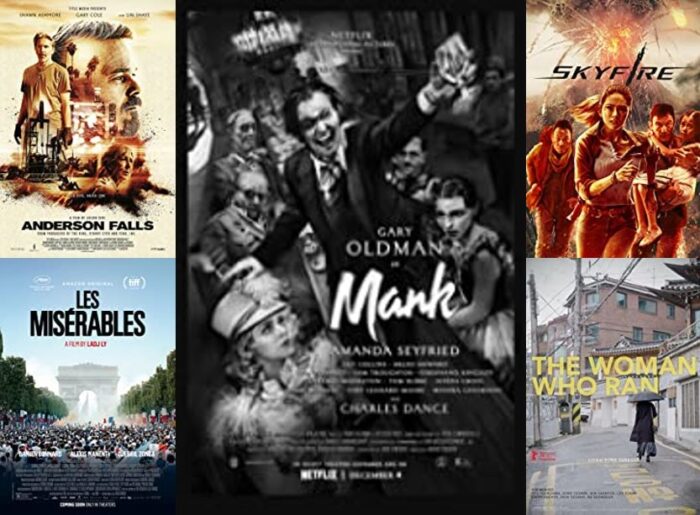
I was not aware of the work of Shawn Ashmore before seeing Darkness Falls. Afterwards, I was left wondering how such an inept performer could be handed a lead role. He plays a cop chasing the father and son team of serial killers who have killed his wife. Ashmore isn’t the only bad thing about this terrible film. Giles Daoust’s script is where the problems start. Is “suiciding” really a word!? Julien Serri directs as if he is as disinterested in the material and even Gary Cole, as one of the killers, cannot save this mess. Available on Amazon Prime if you really must…
Rating: 2.5 out of 10
The following three films are all rentable in the usual places.
Staying in the same genre, we go from the ridiculous to the sublime with Les Misérables. It is set in the Montfermeil district of Paris where Victor Hugo lived (hence the title) and it covers a single shift worked by three police officers. The team is headed up by the dangerous Chris (Alexis Manenti) with his regular partner Gwada (Djebril Zonga) and the newcomer Stephane (Damien Bonnard). As they investigate a bizarre case of a lion cub being stolen from a circus on a sweltering day, tensions with the residents reach boiling point and a near tragic event occurs that tests Stephane’s loyalty to his new colleagues.
With the initial scenes of Stephane meeting Chris and Gwada and then his eccentric new boss it seemed like this could be a 1970s style freewheeling cop comedy. However, when the guys go on patrol the story properly kicks in and the film changes tack. It feels like a realistic portrayal of racial and religious turmoil that can be found in almost any major Western city. It most reminded me of the brilliant L627 from Bertrand Tavernier in 1992. Credit has to go to director Ladj Ly for a remarkable debut feature film. Ly also co wrote the authentic script with Manenti and Giordano Gederlini. The three leads are all perfectly cast too.
Rating: 9 out of 10
If you are in the mood for something less serious you could do a lot worse than Skyfire. On Tianhuo Island in the Pacific Sea, businessman Jack Harris (Jason Isaacs) has built a tourist resort in spite of, or maybe because of, an active volcano on the same island. When the volcano erupts, carnage ensues. A small group of survivors headed by scientist Meng Li (Hannah Quinlivan) and her father Wentao (Xueqi Wang) desperately try to get to safety.
This is a big, old fashioned, dumb disaster movie. There is plenty that is implausible, the stunts are ridiculous and some of the acting (particularly from Xueqi Wang) is poor. But, at the same time, it is hugely enjoyable. Director Simon West knows how to handle the action, the effects are pretty good, Isaacs clearly has a great time utilising a South African accent and Quinlivan makes a good feisty heroine. It also has one really hilarious moment when an unfortunate man tries to jump from one cable car to another.
Rating: 7 out of 10
Staying in Asia, but with a real change of pace, is Sang-soo Hong’s The Woman Who Ran. With her husband away on a business trip, Gam-hee (Kim Min-hee) takes the opportunity to visit three old friends in Seoul. She has mostly trivial, and quite repetitive conversations with each of them. It is only in the last encounter, with Woo-jin (Sae-Byuk Kim) when something significant is discussed, although only obliquely. This is a film that requires a lot of patience and I’m not sure it deserves it.
Rating: 6 out of 10
Finally over to Netflix for one of their most high profile releases of the year with Mank from director David Fincher. In 1940 screenwriter Herman J. Mankiewicz is hired by Orson Welles to pen the script for his debut movie Citizen Kane. As he battles to complete the draft by the deadline imposed by Welles, we see flashbacks to Mankiewicz’s experiences in Hollywood over the previous decade, most notably with MGM boss Louis B Meyer and the newspaper mogul William Randolph Hearst, the inspiration for the story of Kane.
If you come into this film with little or no knowledge of the studio system of the era and with the masterpiece that Mank wrote, then you might be slightly baffled and a little bored by what’s on screen. If, though, you have an interest in Hollywood of the 30s and 40s you should get a lot of enjoyment from the film. Fincher and cinematographer Erik Messerschmidt shoos in gorgeous black and white with added fake reel change marks and using an analogue soundtrack to truly evoke the movies on that time.
Gary Oldman is good as the hard drinking, sharp witted Mankiewicz but the stellar performances come in the supporting roles. Charles Dance as Hearst, Amanda Seyfried as his mistress and Arliss Howard as Meyer are all excellent. Both Lily Collins as Mank’s secretary and Tuppence Middleton, in what has been a stellar year for her, as his wife, do exceptional work too. Liberties with the truth are taken certainly, but that seems to befit a film featuring Welles as a character. I have a feeling that this is a movie that will reward multiple viewings, though I was wowed by it on first viewing.
Rating: 9 out of 10